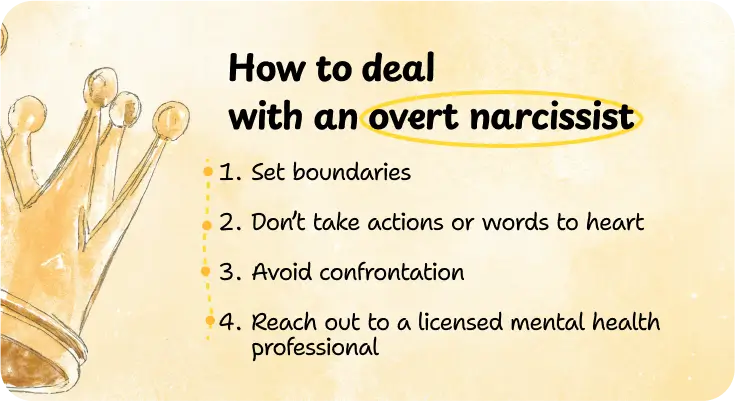Narcissists might seem likable and charismatic at the beginning, but after communicating with them, you can feel unsettled or even drained. Today, we’ll explore an overt narcissist — a type that some call “a classic one.” We’ll learn its hallmark traits, explore real-life examples, and find out how to deal with them.
DSM-5 does not define any specific types of narcissists. Yet, most mental health professionals define between 4 and 10 types. Here, we use a classification of the 8 most common types of this mental health condition, and overt narcissism is one of them.
Find out whether your partner exhibits narcissistic traits and how to deal with them. Take a quick & free test.
What is an overt narcissist? Definition & traits
An overt narcissist (grandiose narcissist) is someone who displays classic traits associated with narcissistic personality disorder (NPD). Their behavior is characterised by dominance and a need for admiration, and is associated with a range of negative outcomes, including aggression, poor interpersonal relationships, and lower psychological well-being. [1]
Narcissistic people are charismatic, successful, and grandiose. Every time they enter a room, people often turn their heads and feel the weight of their presence and sense of self-importance filling the space.
Narcissists believe that their worth comes from achievements, status, or outward appearances. They seek external validation because their inner sense of self-worth is diminished or nonexistent. Yet, their vulnerability and insecurities are hidden so deeply that you won’t ever know about them.
Overt narcissists always expect special treatment and can do anything to get recognized, even if sometimes it goes against moral standards. The most obvious signs of this type are:
- An obsession with attention and admiration.
- Overbearing tendencies.
- A willingness to take advantage of others.
- A combination of extreme self-superiority and manipulative behaviors.
- A strong sense of entitlement.
Overt vs covert narcissist: How to tell the difference
Many people might confuse overt and covert narcissism (vulnerable narcissism), even though these 2 types are pretty different. To distinguish them, check the table.
| Overt narcissism | Covert narcissism |
| Crave constant attention from everyone around | May find it difficult to fit in, but inside they want to be in attention |
| Display obvious grandiosity | Lack of obvious grandiosity |
| Thrive in big companies | Prefer 1-1 communication |
| Always pretend to be the most successful | Often play victims |
| Can use aggressive manipulations to get what they want | Use softer tactics and manipulate less openly |
Common traits of overt and covert narcissists
- A need for admiration, no matter how they’ll receive it. This is a diagnostic criterion for NPD in DSM-5. Thus, we can say that all narcissists are somehow dependent on external validation.
- Belief in being “special.” Both overt and covert narcissists (as well as all other types) truly believe in their self-importance and want to be praised by other high-status people.
- Lack of empathy. The same clinical criteria for NPD diagnosis apply here as well: narcissists find it challenging to recognize or genuinely care about the feelings and needs of others.
- Exploiting others. They can exhibit manipulative tendencies or cause emotional pain to get what they want without feeling guilty.
To recognize narcissists from the spot, working on your emotional intelligence is key. Take a quick and free EI test to find out how well you understand your own and others’ emotions.
Top 5 overt narcissist traits (with examples)
People often consider overt (or grandiose) narcissists as classic ones. So, their main traits will somehow align with the traits associated with narcissists in general. Still, there is something typical only for grandiose narcissism.
1. Self-superiority
Overt narcissists believe that they are special, unique, and entitled. This grandiose sense of self often impacts multiple areas of their life.
For example, they might over-inflate their skills or accomplishments, claiming they could become Olympians shortly after starting a sport. Or they can exaggerate their singing abilities to appear highly talented in front of others.
Overt narcissists tend to embellish or even lie to seem more accomplished than they truly are. Most importantly, everyone should recognize and praise their achievements.
2. Constant need for admiration
When people with overt narcissistic traits feel grandiose, they focus on impressing others. They purchase expensive clothes, drive flashy cars, or display wealth and status to draw attention.
Usually rooted in poor self-esteem, this overt narcissistic behavior is the only way to feel valuable. While overt narcissists might seem super-confident, in reality, they are deeply insecure and rely on external validation to maintain their sense of worth.
3. Lack of empathy & exploitation of others
Putting yourself in someone else’s shoes sounds almost impossible for people with grandiose narcissism. They also live with too high self-centeredness to think about others and might often lack sensitivity to care for someone else.
As a result, people don’t mean very much to them. Dozens of friends are just a background, “the retinue” surrounding “the king.” The main reason overt narcissists communicate so much is to feel seen, valuable, and popular.
When such people need something, narcissists don’t see barriers. They can walk over people and do everything to reach their goals. Female overt narcissists may use their attractiveness or emotional manipulation to exploit others, while male narcissists might rely more on dominance or aggression to assert control.
4. Being charming & good at faking
When narcissists need to receive something without being too pushy, they manipulate. They appear to be good listeners who are really interested in your problems. They seem to be real altruists who can drive you home from work or offer to help with a personal task. But all this happens only when they adore you or you’re valuable to them and have something to bring to the table.
Overt narcissism in relationships can manifest in lovebombing like buying impressive presents, spending most of the time with a potential partner, and pretending to be an ideal person to build relationships with. This reinforces themes of power and control. Yet, when another person falls in love, and a narcissist feels appreciation and admiration, they can change their ways too quickly.
5. Hidden insecurities and problems with mental health
People with a grandiose sense of self hide it deep inside. Sometimes, it’s so deep that they can’t even recognize it. But usually, under the mask of a self-confident, charismatic, and bright person, the feeling is hidden: “I’m not good enough,” or “No one loves me.”
An overt narcissist can’t accept their mistakes, and anything that isn’t ideal makes them feel vulnerable. Acne, second place in a competition, or even the same dress that the other girl at a party has, can lead to extreme anger and irritation.
“Why can’t narcissists show their feelings openly and be vulnerable? Why do they tend to crave being and looking perfect?” Nicole Arzt, LMFT, answers, “People with NPD struggle with vulnerability because it means exposing a part of themselves they work so hard to conceal. Breaking through this barrier feels incredibly threatening. Instead, it feels much safer to put up walls and take in lots of validation and attention. Having these needs met can fulfill the fantasy that the person is “good enough,” even if they don’t feel that way inside.”

Real-life examples of grandiose narcissism
Let’s move to examples of overt behavior so that you’ll be able to spot these people much quicker and avoid the negative impact of their charm.
At work
Think about a typical coworker who always thinks that they are better than others. You have similar roles and get similar tasks, and literally nothing distinguishes you in terms of performance. Still, somehow, they always act as if they’re the only ones making valuable contributions.
- “I deserve a promotion, not you.”
- “It’s my achievement that our group project succeeded.”
- “Actually, my task is much more difficult.” (while it isn’t)
People with grandiose narcissism can be really tough to work with. They might be hostile and appear as if the task is beneath them. At the same time, they might do almost anything for personal gain if the boss asks. To get an additional day off, deserve a promotion, or be praised in front of the team, overt narcissists will be the most dedicated employees ever.
In family
“They are leaders, and you will do everything they want to.” This is the belief that people with overt narcissistic traits can try to impose on everyone in the family.
If they want to watch that one movie in the evening, no one is allowed to turn on anything else. If they want to travel to Hawaii on vacation, there shouldn’t be any talk about other destinations.
Although they may be controlling within the family, they may present as easygoing to others. This is why people can be so confused when a partner leaves an overt narcissist because “their family was so ideal.”
Children of narcissistic parents often feel like they don’t matter, always having to put the narcissist’s needs first. This can lead to childhood trauma and leave them struggling with their identity and self-worth as they grow up.
Reddit story
Here’s a textbook example of overt narcissism published in a Reddit discussion, “What is the best example of narcissism that you have ever witnessed?”
“My mom yelling at me on the way to the hospital on Christmas Eve to see my girlfriend, who just had an early second-trimester miscarriage. Yelling at me because she wasn’t the first person I called for a ride.”
Such behavior is quite typical for an overt narcissist: they focus entirely on themselves and, instead of showing empathy, prioritize their own feelings. At the same time, the emotional experience of others isn’t important to them; the only thing that matters is the fact that they aren’t the centre of attention.
Have you ever met overt narcissists in real life?
What causes an inflated sense of self in overt narcissists?
Let’s unravel the deeper reasons behind it and how the inflated sense of self impacts relationships and well-being.
1. Parenting style
Children of grandiose narcissists may follow the modeling of their parents and, in adulthood, might cover their needs similarly. Yet, it isn’t a 100% guarantee that if your parents were overt narcissists, you would develop narcissistic traits yourself.
While children of narcissistic parents may pick up selfish or manipulative habits, they can also learn empathy and have better self-awareness, especially if they later experience healthy relationships or seek support through therapy.
2. Childhood trauma
According to the study, ACEs (adverse childhood experiences that can turn into trauma) are the primary risk factor for the development of NPD in adulthood. [2] Childhood trauma can shape how someone views themselves and the world around them. For those who experienced emotional neglect, abuse, or rejection, an inflated sense of self can be a defense mechanism.
Think about Joker from Marvel movies. Although often seen as a villain, his need for chaos and constant attention fits the overt narcissist mold. There’s something more than just the parenting style of his mother. It’s about childhood trauma.
Narcissistic behavior is a way of compensating for feelings of helplessness that they experienced in childhood. Similar to Joker, these people might grow up believing that they need to be the center of attention or create chaos to feel valued or noticed.
3. Environment
Not only parents, but everyone around can influence a child to grow up with overt narcissistic traits.
- Society demands that a person be more successful and attractive, no matter what it takes and what you feel inside.
- Pop culture appreciates narcissistic behavior and shows it as a positive example on TV, in movies, and on social media.
- Even peer groups and schools can promote this behavior. When children grow up in a culture that values social status over kindness and empathy, they may feel pressured to adopt specific traits to gain approval.
4. Genetics
There’s no deep-scaled research on whether narcissism is inherited. Still, some studies prove that narcissistic personality disorder is substantially heritable, with 44% of individual differences attributed to genetic influences and the remaining 56% to non-shared environmental influences. [3] So, now we can say that in certain families, children born to narcissistic parents might have some typical traits.
Expert Insight
“If you’re communicating with someone with overt NPD, you may constantly feel like you’re not being heard. You might also experience gaslighting, which means you start second-guessing your truth or feelings. It can feel like you’re in a losing battle. No matter what you say or do, your words seem to get twisted or used against you. Because of this, you may try to avoid conflict at all costs.”
Nicole Arzt
Mental health professional
How to deal with a grandiose (overt) narcissist
If your partner or a family member is an overt narcissist, it may be difficult to communicate with them. But if you want to keep this relationship and take care of yourself, here are some tips to save.
We’ve already provided a detailed guide on how to deal with a narcissist. Below, let’s review some of the most important points and specify them for overt narcissists.
1. Set boundaries
- Prioritize your values. If you communicate closely with a narcissist, it’s also important to clearly define what is acceptable and what isn’t, so you don’t get drawn into endless demands.
- Maintain personal relationships. You also need to spend time with other relatives, friends, and coworkers, so the overt narcissist doesn’t isolate you.
- Recognize manipulation patterns. You may learn to pick when a narcissist engages in emotional neglect and manipulation. Don’t let emotional outbursts control you.
2. Don’t take actions or words to heart
People living with overt narcissism might be too straightforward and say unpleasant things because they lack empathy. Still, their words reflect only their need for control and admiration.
If you want to keep communicating with an overt narcissist, accept that harsh remarks are more about their ego. You can say that it isn’t OK for you to hear it, but if nothing changes, it’s still vital to maintain your confidence. You can also remind yourself of your accomplishments and strengths regularly (or keep a gratitude journal from Breeze), so the narcissist’s words don’t undermine your self-esteem.
3. Avoid confrontation
When you learn to set up your boundaries, it’s better to avoid direct confrontation and remain calm while communicating your limits. Narcissists can do anything to prove that they’re right, so it’s better not to get deeply involved. Instead, you can redirect the conversation, keep your answers brief, and stand by your decisions without overexplaining.
4. Reach out to a licensed mental health professional
A professional can help you handle communication with a person with narcissistic personality disorder, save your sense of self-importance, and learn to defend your boundaries.
Even more, during therapy, you may find out that you don’t need to communicate with someone who has an inflated sense of self at all. It can lead to changes in your life and open the door to healthier relationships.

“I suppose that I live with narcissistic personality disorder (NPD). How can I start developing coping strategies?”
If you think about how to stop being a narcissist, the fact that you’ve acknowledged the narcissistic tendencies is already a great achievement. Then, you can start working on yourself gradually.
Look for reasons why you behave this way
Learning the root causes of your behavior can help you overcome typical patterns. For instance, if you were a golden child, it can be tough for you now not to set unreasonable demands on yourself.
On this step, you can try self-discovery tests from Breeze, communicate about it with a mental health provider, and set up small daily experiments (for instance, deliberately step back in situations where you normally react defensively) to observe how you respond.
Discover your triggers and be mindful of them
Maybe you get angry or feel upset when people don’t admire you or disagree with you. Noticing these moments can help you prevent typical reactions and approach situations more calmly.
You can use Breeze’s mood tracker to analyze these moments and their outcomes. It will let you see patterns in your behavior and gradually change them.
Stop trying to be perfect and learn to accept criticism
It may be challenging for a person with narcissistic traits to understand that they might do something wrong. Thus, you need to gradually get more self-compassionate and notice your mistakes without harsh judgment.
For example, you can try role-reversal exercises. When you feel upset, pause and imagine how the other person sees the situation. This will let you see that people don’t hate you and don’t try to make you feel worse; they just try to solve the problem as well. This will help you build empathy and react in a calmer, less defensive way.
It might be difficult to handle some of these steps alone. If you need to open up to someone and get support, consider visiting a support group or contacting a therapist.
Frequently asked questions
What’s the difference between overt and communal narcissism?
Communal narcissism is a term that describes people with narcissistic traits who focus on acts of kindness and generosity. While it can be more socially approved, they still use this credibility based on social interactions to get validation and receive what they want.
Overt narcissists aren’t necessarily about pleasing people; they’re all about having the spotlight. Instead of kindness, they rely on attention to feel their own importance and neglect the needs of others.
What’s the difference between malignant narcissism, antagonistic narcissism, and overt narcissism?
- Overt narcissists are grandiose, constantly seek attention, and openly demand admiration from others.
- Malignant narcissists tend to be manipulative, abusive, cruel, and combine narcissism with antisocial or psychopathic traits.
- Antagonistic narcissists are competitive and constantly create conflict to assert dominance. They tend to be hostile and extremely critical.
Why do most partners I’ve dated show narcissistic behavior?
There’s a detailed answer to this question in our article, “Why do I attract narcissists?” Yet, if you’re looking for a brief version, here are the most common reasons that push you to choose such people:
- A result of your childhood trauma
- An insecure attachment style
- Fawn trauma response
- Extreme empathy
- Low self-esteem
- Your narcissism
Sources
- Runcan R, Rad D, Runcan P, Măduța C. “A Network Analysis Approach toward Adaptive Overt Narcissism Network.” Behav Sci (Basel). 2023
- Ross AG, Giri S, Anyasodor AE, Mahmood S, Astawesegn FH, Huda MM, Ahmed KY, Mondal UK, Thapa S. “Adverse childhood experiences leading to narcissistic personality disorder: a case report. BMC Psychiatry.” 2024
- Luo, Yu & Cai, Huajian. (2018). “The Etiology of Narcissism: A Review of Behavioral Genetic Studies.”
Disclaimer
This article is for general informative and self-discovery purposes only. It should not replace expert guidance from professionals.
Any action you take in response to the information in this article, whether directly or indirectly, is solely your responsibility and is done at your own risk. Breeze content team and its mental health experts disclaim any liability, loss, or risk, personal, professional, or otherwise, which may result from the use and/or application of any content.
Always consult your doctor or other certified health practitioner with any medical questions or concerns
Breeze articles exclusively cite trusted sources, such as academic research institutions and medical associations, including research and studies from PubMed, ResearchGate, or similar databases. Examine our subject-matter editors and editorial process to see how we verify facts and maintain the accuracy, reliability, and trustworthiness of our material.
Was this article helpful?








